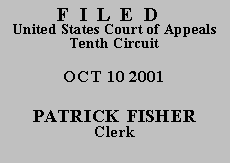

| RANDY LEONARD SMITH,
v.
JAMES SAFFLE |
No. 01-5078
(D.C. No. 00-CV-96-K) |
Before the district court, Smith did not adequately raise mental incompetence as a ground for equitable tolling. In his response to the Government's motion to dismiss his habeas petition as untimely, Smith asserted that "circumstances cited as possible [bases] for applying equitable tolling [are] claim[s] of mental incompetence or actual innocence. Petitioner has raised such claims in state courts that would give rise to application of the equitable tolling principle." The remainder of his brief, however, focuses on his ineffective assistance of counsel claim. According to Smith, one element of that claim is his counsel's failure "to investigate petitioner's actual innocence and mental incompetence claim[s]." The cases cited by Smith before the district court pertain to ineffective assistance, not equitable tolling based on mental incompetence. The habeas petition itself and accompanying affidavit assert Smith's actual innocence, but make no mention of his inability to file a habeas petition or other court pleadings. The district court rejected actual innocence as a basis for equitable tolling, but did not address mental incompetence.
Smith's vague and unsupported references to mental incompetence were insufficient to put that issue before the district court as a basis for equitable tolling. Although "[a] pro se litigant's pleadings are to be construed liberally and held to a less stringent standard than formal pleadings drafted by lawyers," it is well-settled that "conclusory allegations without supporting factual averments are insufficient to state a claim on which relief can be based." Hall v. Beamon, 935 F.2d 1106, 1110 (10th Cir. 1991). Because the issue was not raised below, we need not address it. Walker v. Mather (In re Walker), 959 F.2d 894, 896 (10th Cir. 1992).
Even if the issue had been raised below, Smith's allegations are insufficient to warrant equitable tolling of the limitations period. Equitable tolling based on mental incapacity is limited to "exceptional circumstances." Biester v. Midwest Health Servs., Inc., 77 F.3d 1264, 1268 (10th Cir. 1996). This court has held that such circumstances are not present where the party urging tolling has been able to pursue legal action during the period of his or her alleged incapacity. See id. Here, Smith sought post-conviction relief in state court in both 1994 and 1999. He has failed to allege circumstances suggesting that his mental incapacity rendered him unable to file a habeas petition in federal court.
Accordingly, we deny Smith's certificate of appealability and DISMISS his appeal.
ENTERED FOR THE COURT
David M. Ebel
Circuit Judge
*.After examining appellant's brief and the appellate record, this panel has determined unanimously that oral argument would not materially assist the determination of this appeal. See Fed. R. App. P. 34(a)(2) and 10th Cir. R. 34.1(G). The case is therefore ordered submitted without oral argument. This Order and Judgment is not binding precedent, except under the doctrines of law of the case, res judicata, and collateral estoppel. The court generally disfavors the citation of orders and judgments; nevertheless, an order and judgment may be cited under the terms and conditions of 10th Cir. R. 36.3.